Ever scoured the vast internet for the best writing resources, only to end up lost in a sea of options?
I feel ya.
You’re searching for quality online resources and writing tools that actually work, right?
Well, good news!
We’ve curated a list of over 30 of the most powerful online writing resources for budding authors like you and laid them out in 8 key stages with actionable tips to sharpen your writing skills.
Eager to level up your game?
Let’s dive right in.

Note: I’ve focused on non-fiction books here, though you’ll find that some of the advice — particularly on areas like research and time management — will apply to other types of writing too.
Table of Contents
- Stage 1: Develop an Idea That’s Practically Guaranteed to Sell
- Stage 2: Create a Rock-Solid Structure
- Stage 3: Research Efficiently
- Stage 4: Find the Time, Energy & Focus to Write
- Stage 5: Get Your First Draft Down on the Page
- Stage 6: Turn Your Rough Draft into a Polished Gem
- Stage 7: Take a Deep Breath & Send Your Work Out into the World
- Stage 8: Get Your Work in Front of (the Right) Readers
Stage 1: Develop an Idea That’s Practically Guaranteed to Sell
You can’t have a great book without a great idea.
I’ve written a lot over the past eight years, and one thing I’ve learned (the hard way!) is that the ideas that I think are great aren’t necessarily the ones my audience will want to buy.
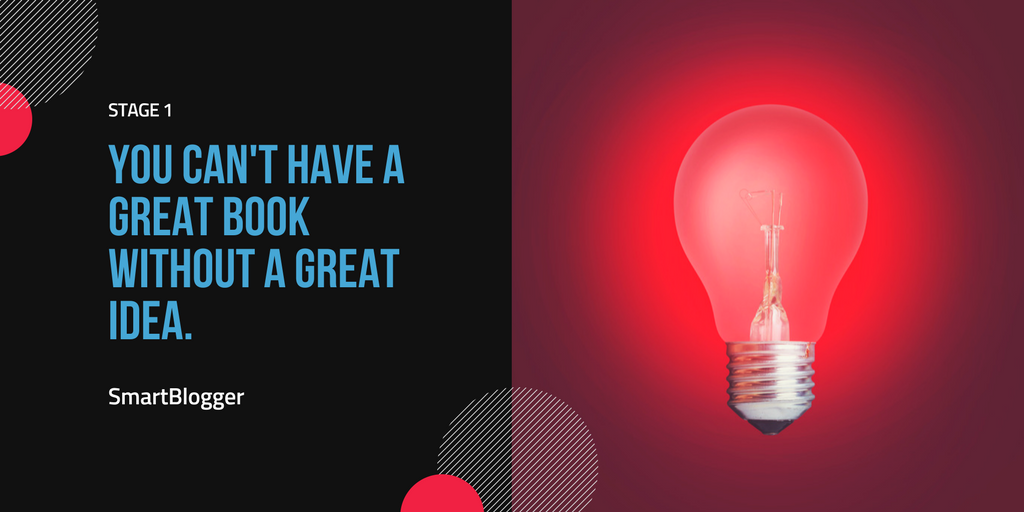
The following resources will help you come up with ideas and road-test them so you’re sure the book you’ll be spending months of your life on will be one that people actually want to read:
#1. Got a Book Idea? These 4 Steps Reveal if It Will Sell
Author: Dave Chesson
Source: Make a Living Writing
This post is all about creating a book that people already want. It’s a guide to doing market research on Amazon, with lots of handy links to free and paid tools you can use.
- Unless you have a huge email list of your own, you won’t write a bestselling book without having an idea that’s “organically discoverable” (i.e., people are searching for it on Amazon).
- You can use the ABSR (Amazon Best Seller Rank) for existing books on similar topics to judge whether you can make make money writing your book.
- A popular idea isn’t enough; you also need to find a topic where you won’t have too much competition.
#2. Writing: How to Get to Know Your Target Readers Better and Craft Your Self-Published Books to Resonate with Them
Author: Dan Blank
Source: Self Publishing Advice Centre (the Alliance of Independent Authors’ blog)
In this post, Dan explains how you can take very specific steps to find out exactly what your ideal audience likes, based on the books they’re already reading and the authors they’re already following.
- One of the best ways to learn about your market and refine your idea is to look at similar books that already exist.
- When you’re using social media, focus on making a connection — don’t just be promotional.
- Be consistent with reaching out through different channels (social media, emails, events, etc). Do a little bit each week.
#3. 9 Essential Tips for Researching Your Nonfiction Book Idea
Author: Debbie Reber
Source: Debbie Reber Writing Coach
Although this is a short, succinct post, Debbie offers great practical tips for digging deeper into your idea — for thinking not only about how to position and sell your book, but also about what to include in your outline and plans.
- If you already have an audience, survey them to ask for specific feedback on your ideas. Surveys can even give you useful statistics or quotes to use.
- Look for existing conversations around your topics: in blog posts and comments, in a Facebook writing group, in news coverage, and more.
- Set a specific end date for your research so that it doesn’t drag on and on.
Stage 2: Create a Rock-Solid Structure
Once you’ve got an idea that you’re confident will sell, it’s time to figure out the structure of your book and create a full chapter-by-chapter outline.
Your outline is particularly essential if you want to submit a book proposal to agents or publishers. But even if you’re self-publishing, having a solid structure means you’ll end up with a much better book as a result.

These resources will help you corral your ideas and outline like a pro:
#4. How to Get Started Mind Mapping Your Book (and Everything Else)
Author: Roger C. Parker
Source: The Book Designer
Before you start your outline, you should get all your ideas down on paper through mind mapping. This post explains what it is and how it’s done, and offers some suggestions for making the most of mind mapping software.
- Mind mapping allows you to see your whole project — and how various bits fit together — at a glance. It makes it easy to move ideas around, add new ones, or remove weaker ones.
- While some authors like to mind map on paper, if you’re using this for your full outline, you’ll want to use software.
- There are lots of different mind mapping programs out there, but all share common features. Most allow you not only to put your topics and subtopics on the map but also include notes, comments, relationships and other features to help you link and annotate your ideas.
#5. The No-Stress Way for Writers to Outline
Author: David Carr
Source: The Book Designer
If you’re feeling overwhelmed by the idea of outlining, or if your mind goes blank whenever you sit down to plan out your book, David’s post breaks things down into simple steps — with a focus on gathering your ideas then getting them into a logical order.
- Outlines don’t have to be scary, and you definitely don’t have to start with a blank page and go straight to creating a linear outline.
- By outlining, you won’t get stuck when you’re writing. You’ve already thought about all the key points you need to bring in. You can also jump ahead in the outline: you don’t have to write in sequential order.
- Start with the big picture and narrow down: come up with broad topics, get them into a logical order, then take each topic in term and break it into key points.
#6. Using Scrivener to Outline Your Non-Fiction Book
Author: Lise Cartright
Source: Author Basics
This video and accompanying post explain how to use a writing tool called Scrivener to outline a book by using its corkboard view. In case you’re not already familiar with Scrivener; it’s a paid-for piece of software that many fiction and non-fiction writers use as an alternative to a word processor. It’s highly recommended; see next resource)
- You can group ideas from your mind map to form the chapters or sections of your book.
- Scrivener’s “Corkboard” view can help you see, at a glance, how your book all fits together. You can easily drag and drop ideas to refine your chapter order.
- Adding a brief paragraph to each chapter heading will help when it comes time to write the book because you’re no longer starting from a blank page.
#7. Scrivener [Software]
Source: Literature and Latte
Writers love using Scrivener to write their books because it creates a much more organized writing experience. It’s not only beneficial for outlining, but will help you keep track of everything once you write the book. The more of your book gets written, the harder it becomes to navigate in tools like Word. Scrivener fixes this problem.
If you want to give Scrivener a try, there’s a free 30-day trial (it only counts the days on which you actually use the software, so you could use it 3 days per week for 10 weeks). After that, it costs $45 (Mac) / $40 (Windows) to buy. It has a bit of a learning curve, but it’s worth it (and you can find video tutorials on its website).
Stage 3: Research Efficiently
Note: Although I’ve put this as Stage 3, there’s no rule saying you need to do all your research before you begin writing. Some authors prefer to draft first, leaving gaps or sections to come back to at a later stage.
The idea of “research” can conjure up images of dusty libraries, a complicated trawl through a research paper, or daunting conversations with experts. If you’ve never done much research before, the idea of it can be enough to put you off writing altogether.
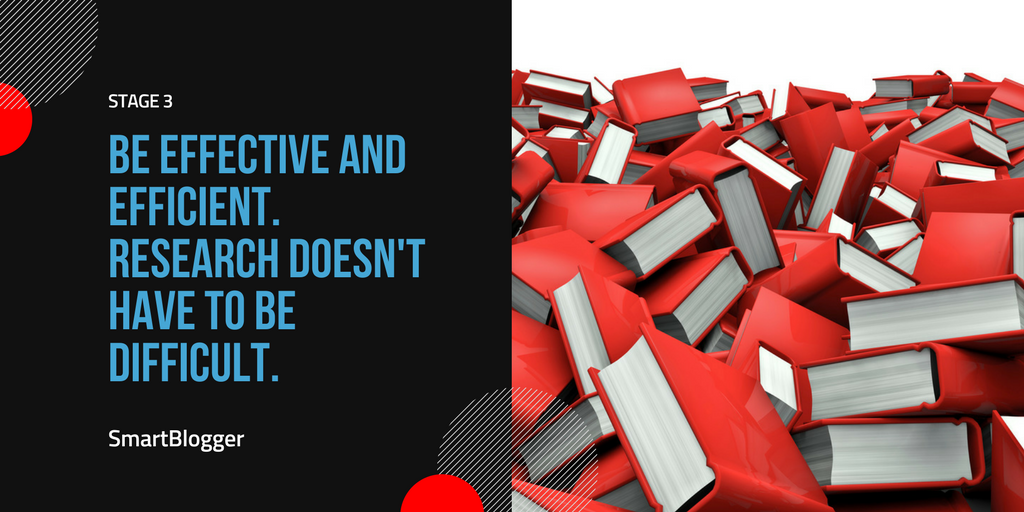
Research doesn’t need to be difficult, though. All of these resources demystify the process:
#8. How Real Online Research Works
Author: Paul Gil
Source: Lifewire
This excellent post isn’t aimed specifically at authors, but at anyone conducting research online. It distinguishes between “hard research” (when you’re looking for objective, scientific facts) and “soft research” (when you’re looking for subjective, opinion-based sources), and offers specific suggestions on the types of sources to turn to.
- It’s crucial to use the right online authorities for your topic. Don’t simply Google for a keyword: think about what sites will provide useful, accurate information.
- Experiment with different keyword phrases and combinations, starting with broad big-picture researching before narrowing down and using specialist search engines.
- Watch out for specific red flags when you vet the resources you’ve come across: avoid sites that are amateur-looking, that are plastered with ads, or where the author appears to be overly positive or overly negative.
#9. Journey into the Hidden Web: A Guide for New Researchers
Author: Ryan Dube
Source: MakeUseOf
This is a fascinating, very in-depth look at the “hidden web” (or “deep web”, “invisible web”, etc.): the huge volumes of online information that are not accessible via a standard search engine. While some of this won’t be relevant to authors — e.g., the first section is more focused on personal, family research — it also looks at academic writing, particularly research around academic databases and search engines like JSTOR.
- The “visible” web — accessible through search engines — isn’t all there is. There is a LOT of information that you’ll never find through a Google search because it isn’t “crawlable.”
- Tor is an alternative web: a separate network where websites have to be accessed through a special browser (the “Tor Browser Bundle”). There’s a lot of dodgy stuff on Tor (pirated and criminal content, for instance) — but it’s also used by journalists and protesters who want to keep their online activity away from potential prying eyes.
- There’s an amazing volume of statistical information online, which you can find using government databases and academic databases (you’ll find links in the post).
#10. Writing a Book? 9 Killer Research Tips
Author: Chandler Bolt
Source: Self-Publishing School
This post takes a closer look at the idea of writing first, then researching. Chandler focuses on efficient research: making sure you find out what you need to know to write a great book, without spending too much time bogged down at this stage.
- Turn off the Internet when you’re writing, so that you don’t get distracted by researching (or by social media) when you’re focusing on your first draft.
- Organize your research: it doesn’t matter exactly how, so long as you keep it all in one place: virtual folder, physical folder, Evernote or Scrivener could all work.
- Consider taking on an intern or hiring an assistant to help you out with your research.
#11. Help a Reporter Out [Email List]
Source: Help a Reporter Out
This huge mailing list is a fantastic resource for researching pretty much anything. You can send out a message saying what you need and find loads of great sources: individuals who’ve signed up to receive messages about their particular area(s) of expertise.
Note, though, that HARO requires your website/blog to have an Alexa ranking of one million or less before you can send out a request for sources. (To give you some idea of rankings, Smart Blogger is at 47,868 and my own site Aliventures is at 639,675.)
You can sign up to HARO as a source, if your book’s topic is your particular area of expertise. That way, you can get quoted in other people’s articles and books — which is a great way to market your own.
Stage 4: Find the Time, Energy & Focus to Write
Once you’ve got an outline and you’ve done enough research to at least begin — it’s time to write! (Not everyone can afford to hire a ghostwriter, after all.)
One of the biggest struggles that authors face, though, is actually getting their writing done consistently.
Maybe you love coming up with ideas and even writing outlines and noting down interesting bits of research … but when it comes to the actual writing, you end up stalling.
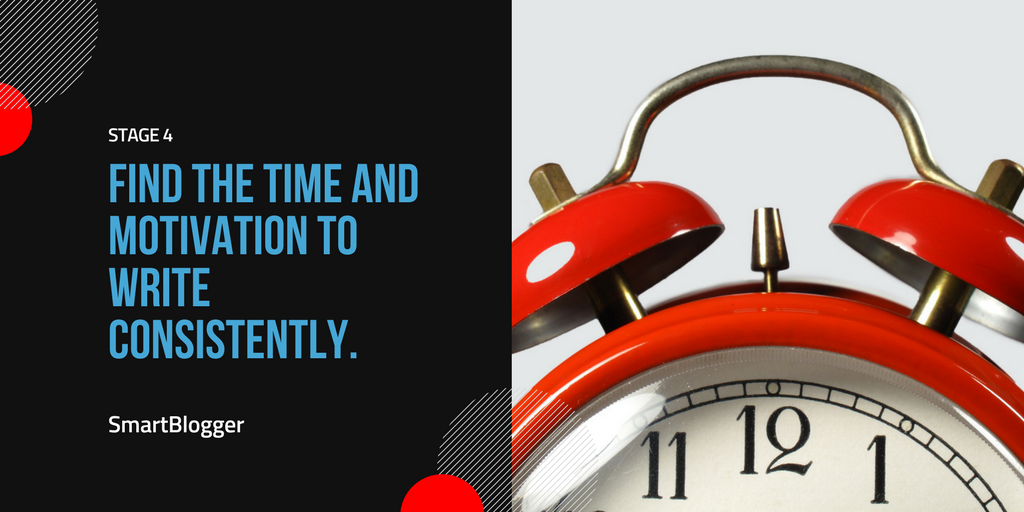
Whether your problem is a lack of time, or you’re simply struggling to focus when you sit down to write, these are some great resources to help you:
#12. Use the Two-Hour Rule to Make Progress on Your Creative Projects
Author: Charlie Gilkey
Source: Productive Flourishing
In this post, Charlie explains why it’s difficult to get into creative projects in very small chunks of time — and why a two hour block of time works better.
- While some tasks can be easily fitted into short (15/30 minute) chunks, it takes a bit of time to get into the flow of a creative task like writing. You want to work in longer bursts.
- It’s hard to focus for more than about two hours on something intensively creative.
- You might have no idea how many words you can expect to write in a day or week, but you probably have a good sense of what you could produce in a two hour block.
#13. 10 Ridiculously Simple Steps for Writing a Book
Author: Jeff Goins
Source: Goins, Writer
This post offers a lot of excellent tips and many are specifically about finding the time and keeping up motivation to write. It also includes a handy chart of roughly what word length equates to what type of book (e.g. “20,000 words = short eBook or manifesto”).
- Writing a book happens in three phases: Beginning (you have to actually start), staying motivated (conquer self-doubt and overwhelm) and finishing (avoid languishing in the “almost finished” phase).
- Have a set time (ideally daily) and place to work on your book. Write some each day and it quickly adds up.
- Set a total word count for your book. Are you producing a short thesis statement, personal statement, or a huge academic tome? A word count keeps you on track so you don’t end up with too-long or too-short chapters as you write.
- You must forgive yourself when you mess up. All writers mess up. The difference with writers who make it is that they learn their lesson and keep going.
#14. 12 Time Management Tips for Writers
Author: Michelle V. Rafter
Source: WordCount
Michelle takes a look at some key difficulties that writers face (like managing their own expectations and the need to work on multiple projects), and offers practical tips for staying productive. While some of these are familiar ones (like “turn off distractions”), others might be newer to you.
- Time management issues may show up as a lack of balance, getting distracted, having unrealistic expectations, lacking margin and flexibility, or struggling to deal with multiple projects on the go at once.
- Try following a “formal productivity regime”: a system like David Allen’s Getting Things Done.
- Set daily or weekly goals and reward yourself when you meet them. Or, if you prefer, use a daily to-do list and enjoy checking things off!
#15. Free Planners and Worksheets Designed to Help Creatives Stay Focused and Productive [Free Downloads]
Author: Charlie Gilkey
Source: Productive Flourishing
These excellent planners come in various different flavors depending on what you’re trying to accomplish. Some help you plan over a long-ish period of time (the Momentum Planners) and others are good for breaking down tasks (the Individual Project Planner) or are designed for specific aspects of your work (the Blog Post Planner and Calendar).
Stage 5: Get Your First Draft Down on the Page
Writing a book can seem like a daunting project and at this stage you might start questioning whether you have it in you. But you just need to get that first draft out of your system.
If you can write a blog post, you can write a book too! You can even structure your book chapters like blog posts. Many non-fiction books use the same direct, conversational tone you’d use on your blog. Some even use blog posts as the basis of a book (e.g. Michael Hyatt’s Platform and Darren Rowse’s 31 Days to Build a Better Blog).
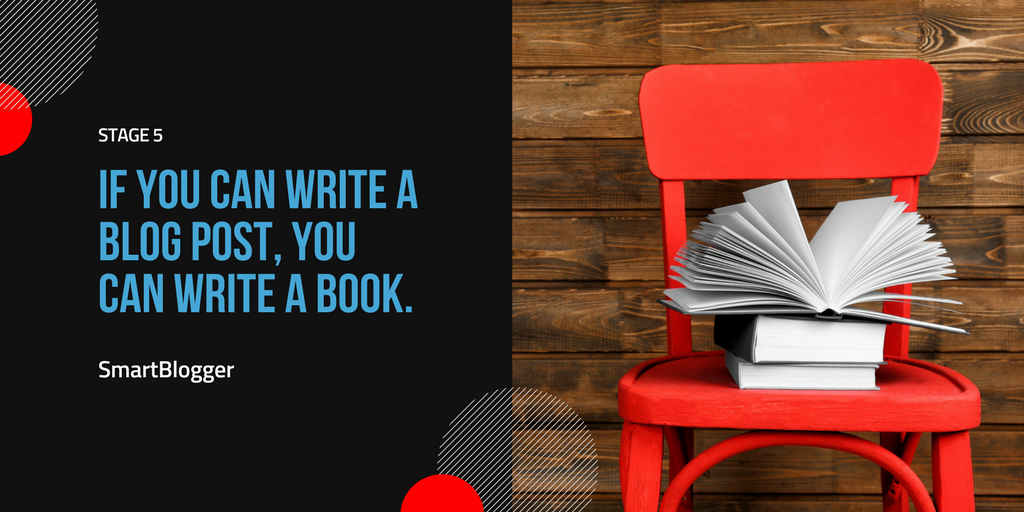
Use the following resources to help you get your power words out of your head and onto the page::
#16. How to Dictate Your Book With Monica Leonelle
Author: Joanna Penn
Source: The Creative Penn
There’s no rule that says you have to type your book … if you prefer, you could write by dictating it. Many very prolific authors (including freelancers and “indie” fiction authors) are huge fans of dictation. This podcast — with full transcript — takes a look at the process and how to get started.
- Even if you feel that you think by writing, you can learn to dictate: just be patient. Think about speaking in phrases rather than in words, as that’s how dictation software works.
- Your writing process may need to change a little for effective dictation. For instance, you might outline in more detail before starting to dictate.
- Dictation is a lot faster than typing: Monica can dictate at 3,000 – 3,500 words on average per hour. You don’t have to dictate every word, though: you can still type when it suits you!
#17. Concentration: 22 Ways to Stay Focused on Writing
Author: Matthew Stibbe
Source: Articulate
If you find your attention wandering as you write, this list has lots of great ideas to try — from the super-practical, like using “TK” to mark facts to look up, to the more inspirational, like the “rock and river” principle.
- You’ll enjoy writing more (and write better) when you concentrate rather than multitask.
- Don’t mix writing and editing. Get the first draft down, then worry about getting every sentence right. Keep moving forward as you draft.
- Accept that distractions crop up, but do your best to minimize them by noticing and labelling them, and by switching off your TV/phone/email, etc.
#18. Practical Tips on Writing a Book from 23 Brilliant Authors
Author: Steve Silberman
Source: NeuroTribes
This huge post is packed with great advice from non-fiction authors writing on a wide range of subjects. Some of the tips deal with the pre-writing and editing, but there’s a lot of focus on the writing itself and how to get the words down on the page.
- First drafts are allowed to suck. Don’t worry, just keep writing.
- Remember that you’ve done this before, just not in a such a long form. The techniques you’ve used for blogging/freelancing/whatever else you’ve written still apply.
- Find a way to organize notes and scraps of information as you write. (Note: Several authors here also mention Scrivener.)
#19. Dragon NaturallySpeaking [Software]
Source: Amazon
While there are free dictation options out there, many authors recommend using Dragon NaturallySpeaking — which you can use not only to dictate but to browse the web, edit your text, and more. The most recent “home” (not premium) version is currently $39.72 on Amazon.
Alternatively, if you’re on a tight budget, Google Doc’s “voice typing” feature has a decent reputation and is free.
Stage 6: Turn Your Rough Draft into a Polished Gem
Once you’ve finished your first draft, take some time off from writing and celebrate! Many would-be authors never get this far.
After you’ve set your work aside for a few days or weeks, though, it’s time to read it through and start making notes about everything you need to change, cut, or add.
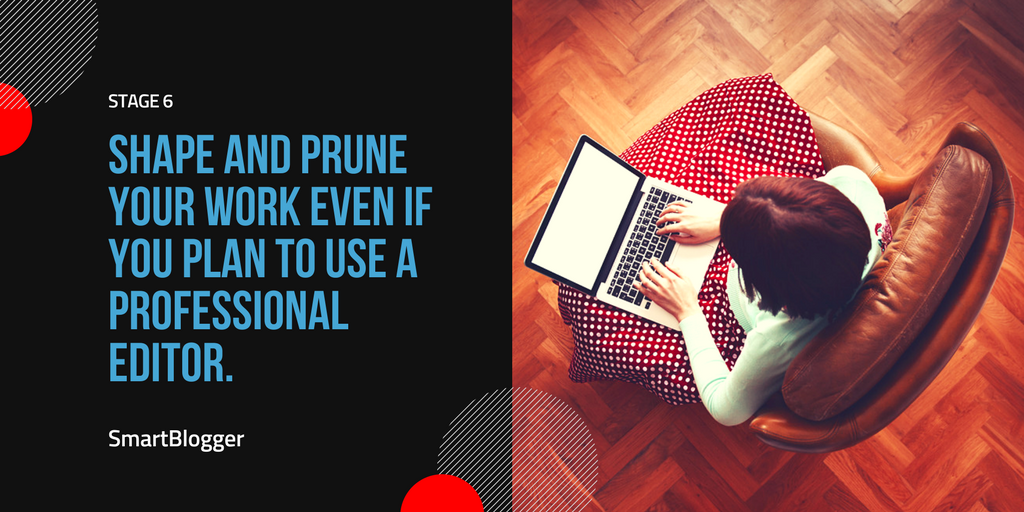
If you can afford to bring in a professional editor, do! But before that, these resources will help you shape and prune your own work:
#20. The Three Stages of Editing (and Nine Handy Do-it-Yourself Tips)
Author: Ali Luke
Source: Aliventures
This post explains that when you edit, you’ll want to make changes in the right order: there’s little point perfecting a sentence or paragraph that you later cut completely. Work on big-picture revisions first, then smaller edits, and finally proof-read.
- Before you edit the nitty-gritty details, use the “Revision” stage to make major changes, like cutting out whole chapters or moving sections around within the manuscript.
- When you’re editing, cut out unnecessary words. They add clutter and weaken your writing.
- It helps a lot to proofread on paper, or even to read out loud. Otherwise, your eyes just skip over mistakes.
#21. Self Editing Basics: 10 Simple Ways to Edit Your Own Book
Author: Blake Atwood
Source: The Write Life
Even if you are using a professional editor (or turning to beta readers for help), you’ll want to give your book an initial edit yourself. This straightforward post offers practical and realistic advice on how to do just that.
- Put your manuscript aside for a few days before you start to edit. That way, you can come back to it with fresh eyes.
- Use the “search” function to find any words that you habitually misspell, and correct them. You can also use this for words you tend to overuse (your “crutch words”).
- Don’t keep on editing endlessly: you’ll never reach perfection. If you can, hire a copy editor to help you put that final polish on your manuscript.
#22. 5 Ways to Find the Right Freelance Book Editor
Author: Stacy Ennis
Source: JaneFriedman.com
Finding the right editor for your book can be tricky; in this post, Stacy outlines some key things to look for — not just an editor who’s experienced, but also one who works well with their clients.
- You want an editor who’s not only experienced but who you enjoy working with: someone who seems friendly and approachable.
- Get a referral from friends, if you can, or look in the acknowledgements of books that you’ve enjoyed and considered to be well-written.
- Talk to the editor’s previous clients and find out what the editing process was like and how happy (or not!) they were with it.
Stage 7: Take a Deep Breath & Send Your Work Out into the World
If you want to go for traditional publication, it’s normal to approach publishers once you have an outline and a sample chapter or two. Some first-time authors prefer to write the full manuscript first, though, so they’re confident they can complete it.
These days, more and more authors self-publish (for full creative control and a bigger share of the royalties). This may be a good route for you if you already have an established audience.
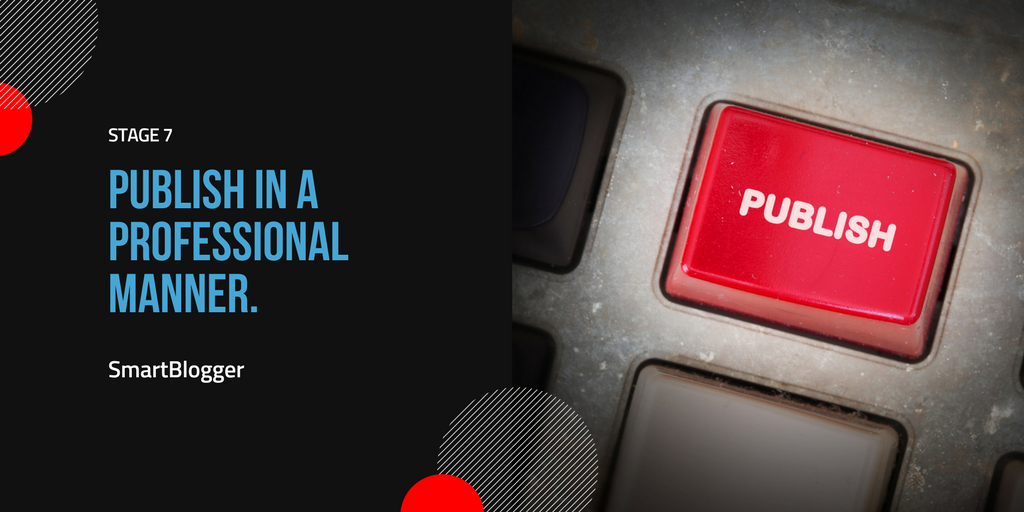
The three resources that follow cover the different publication routes.
#23. Start Here: How to Write a Book Proposal
Author: Jane Friedman
Source: JaneFriedman.com
While your outline is part of a book proposal, it’s far from the whole thing. This post explains what you need to include — and emphasizes the importance of making a strong business case for your book.
- If you want to get a traditional publishing deal, you have to write a book proposal. This applies even if you’ve already completed the book.
- Your business case is crucial: your platform and expertise are much more important to publishers than how brilliant a writer you are. (You need to be a competent writer, but you definitely don’t need to be the next Shakespeare.)
- Every book proposal must answer the key questions “So what?”, “Who cares?” and “Who are you?”
#24. How To Self-Publish An Ebook and #25. How to Self-Publish a Print Book
Author: Joanna Penn
Sources: The Creative Penn — Ebook and Print Book
These two excellent, detailed guides from prolific indie author Joanna Penn explain in very straightforward terms how to go about self-publishing in both ebook and print formats. They look at a lot of practical, tactical considerations (like “exclusivity vs. going wide” and whether to use print-on-demand).
- Even if you don’t personally read ebooks, many people do, and most independent authors make the vast majority of their money from ebooks, not print books.
- However, it’s also well worth publishing in print. It can be very personally rewarding to hold your finished book … and some readers will want to buy the print version for their bookshelf. Even those who don’t buy print books will see the “comparison pricing” showing what a great deal the ebook version is!
- These days, you can publish a print book as “print on demand,” so you don’t need to pay for and store any inventory.
#26. 8 Self-Publishing Secrets for Designing An eBook Cover
Author: Rob Nightingale
Source: MakeUseOf
If you’re self-publishing, you need a professional-quality cover. It’s always best to hire a professional, but if you’re determined to design your own cover, read this article first. It’s packed with great tips, with lots of examples and links. If you’d rather bring in a pro, this post is still useful because it tells you what to check for once they’ve completed their design.
- Designing covers that work online is very different from designing a good print cover. In particular, the author name and title need to be visible at small sizes.
- When you’re looking for images to use, avoid clichéd stock photos, think about mood and feelings rather than specific keywords, and be willing to pay for a good image.
- Pay very careful attention to typography as this can make a huge difference to how professional the cover looks.
#27. Monthly e-Book Cover Design Awards
Author: Joel Friedlander
Source: The Book Designer
One of the best ways to see what works in book cover design is to look at lots of different examples. Each month, Joel publishes a whole load of ebook covers (mainly fiction but some non-fiction) that have been submitted to him — along with his comments.
- It’s very hard for authors to design a good cover! Unless you’ve got significant design experience, you’ll be best off hiring a professional.
- Typography can let down an otherwise good book cover: the font may be difficult to read, too small, or wrong for the genre.
- All the elements included on the cover need to fit together seamlessly: they shouldn’t look like they’ve been pasted on or added as an afterthought.
Stage 8: Get Your Work in Front of (the Right) Readers
Publishing your book is far from the end of the process of creating a bestseller: you need to market, too.
This is the case even if you traditionally publish. Unless you’re already an established name, your publisher will not have a huge budget for promoting your book — and you’ll be expected to do a lot of the work yourself.
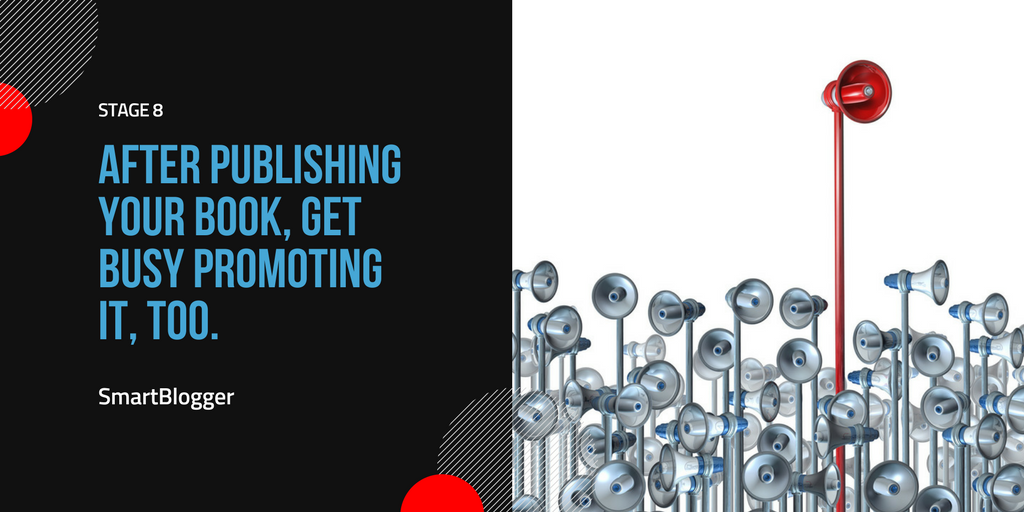
Marketing can seem a bit daunting or mysterious at first, but these resources break down the process and make it much more straightforward:
#28. The Author’s Guide to Building an Email List (and Selling More Books)
Author: Tom Morkes
Source: TomMorkes.com
This very thorough guide explains how to market a book effectively, explaining why you need an email list and how to go about setting one up. Tom includes case studies, screen shots, and lots of links. You may well want to bookmark the post so you can refer back to it.
- You can’t use Amazon to market your book. It’s a great sales channel, but you need to drive attention to your book through marketing channels.
- Having an email list is essential: it allows you to get in touch with your audience directly and easily.
- You’ll need to give away something to encourage people to join your email list: many authors use a free book or course. This could be something short or something full-length.
#29. 15 Tips for Promoting Nonfiction Books Successfully
Author: Nina Amir
Source: Write Nonfiction Now!
This round-up post brings together lots of excellent advice from different authors: some of the suggestions are high-level strategic ones and others are very specific, like suggestions on what to include in your online media kit.
- There are many different ways to promote your book. Find out what’s effective for you, and what you enjoy (or at least don’t actively hate!)
- Your email list is crucially important, and your marketing should point people toward your free gift for opting in.
- Partner up with other authors, coaches, experts, etc. who have an on-topic audience for you and offer them a guest post, interview, or whatever might work for their blog/podcast.
#30. Should Indie Authors Put Endorsement Quotes or “Puffs” on Self-Published Books?
Author: Debbie Young
Source: Self Publishing Advice Centre (the Alliance of Independent Authors’ blog)
The use of “puff quotes” (endorsements on the cover of your book) is a divisive one. Some authors feel they’re a huge boost to sales and marketing efforts, and feel they’re useful for adding extra information on the cover … but other authors think they could be actively off-putting.
- If you are going to use a puff quote, get one from the right person — it needs to be a name that your readers will recognise, and someone whose opinion they’ll trust.
- Use puff quotes that add something to the information already on the cover (for instance, they might give readers an idea of the tone or style of the writing).
- Consider using reviews as a source of puff quotes: take a sentence or phrase from a review, check the reviewer is happy with you using it, and put that on the cover.
#31. Self-Publishing Success Stories: How I Do It — with Joseph Alexander
Author: Joseph Alexander
Source: Self Publishing Advice Centre (the Alliance of Independent Authors’ blog)
This post doesn’t just cover marketing; it also looks at some other areas like integrity and quality, prioritizing, and moving into publishing other people’s books as well as just publishing your own.
- Creating a branded series of books can be particularly powerful; if people have bought one, they’ll likely buy others. This also allows you to partner up with other writers (who can write books on topics that aren’t quite your area of expertise).
- Consider getting your work translated into other languages, so you can reach a worldwide market.
- It’s hugely rewarding to hear from people who’ve read your book and who’ve benefitted from it. When you’re writing, do your best work and have integrity.
Ready to Write Your Bestseller with These Writing Resources?
Whether you’re a student or a seasoned pro, writing a book isn’t easy.
Writing a bestselling book is considerably harder.
Of course, nothing can guarantee success, but with this curated list of online writing resources, you’re a step closer to realizing your dream.
Use it as your personal writing center to enhance your creative writing skills.
So, roll up your sleeves, start with an online resource, and take action!




Hey Ali,
Writing a book can be really scary. I have it from a very long time but the problem is that I am too busy with my WordPress work.
I totally agree with the point of building an email list. Whether you want to get a new idea or spreading your words, you must have an email list.
More people get interacted and share their view which can totally be an awesome thing.
Think about the marketing factor. People write books but don’t get published because of their poor knowledge in marketing.
How can you make people know about your book? That’s a major problem.
The case study you have mentioned can help many authors. We all need a positive push.
Thanks for elaborating these points.
Have an amazing week ahead.
~Ravi
Thanks, Ravi — and it is very hard to carve out the time to write a book.
Marketing is of course a huge factor in a book’s success, and it can be quite daunting for authors who feel that they just want to write. I think, fundamentally, you need to have a strong idea that you know people will want to buy … and that makes marketing much easier because you’re simply sharing something that your audience will (hopefully!) find super-useful. 🙂
Ali, hi! I see constant updates on the article – believe, that on the moment it’s like treasure’s box already with tons of valuable tips inside 🙂 I actually loved all your hints but on the top of it ( for me ) was that you find time to actually write your book! Yes, concentration is the thing I can add my last discovery in book promotion that is e-mail marketing. Helping a lot with minimal time and money input. There are plenty of providers in the market, though I’m sticking to Mailerlite ( https://www.mailerlite.com/authors ), that is not so branded, but has all must-have features ( HQ landing pages, drag-and-drop editor and analytics, that already helped to grow my subscribers list) and prices are more than friendly. So perhaps you have some additional tricks on how to promote your freshly-written book?
Such a great resource Ali – and so timely. I was reading some of your great posts on Write To Done only yesterday, looking for just this! Now I have no excuse not to get that blockbuster done and published:)
I’m so glad the timing worked well for you, Laura! Very best of luck with that blockbuster. 🙂
Ali, Wow! What an insanely useful article you’ve put together. You are correct, though; after skimming through it, I will need to come back to each piece, one week or month at a time! For those not yet sure of a “best-selling” non-fiction topic, I also suggest Jon’s Freedom Machine course for learning to test out ideas on Medium.
Cheers!
Carla
Thanks for the great suggestion, Carla. 🙂 Yes, there’s loads to dig into here … I think I’ll be bookmarking the post myself so I can come back to some of these again as I work on my current book!
So much… so much I want to mention in this comment about your post Ali! My mind’s buzzing with ideas, questions and potential action points. I’ll try making this comment as coherent as possible.
I loved David’s idea of starting with the bigger picture and narrowing down. It reminds me of Chris Anderson’s ‘Throughline’ (tree trunk) concept for a talk (TED or otherwise).
While collecting feedback for a potential online course, I observed that courses which offer tangible results get attention. For instance, Jon’s course on Guest blogging offers tangible results and gets tremendous interest. But a course I planned on productivity… umm… not so much. Do you think the same applies to a non-fiction book? Do readers want books with tangible takeaways?
Also, what’s the optimum time to research and write a book? For instance, completing the Rubik’s cube in 20 seconds is the absolute gold-standard. Does something similar exist for authors?
Thank you for such an insightful post. It goes straight on Twitter and in my Pocket app, where it gets another ‘Recommend’. Cheers!
“Do you think the same applies to a non-fiction book? Do readers want books with tangible takeaways?”
That’s a very interesting point. I think it depends on the TYPE of book (for instance, someone reading an inspirational memoir probably isn’t fussed about concrete action steps or anything…)
I think having a very clear defined topic (like “guest posting”) is always a good idea, and I think focusing on tangibles is probably wise in the majority of genres. With courses, because the price tag is higher than a book, I think participants (understandably!) want to feel that they’ll have achieved something as a result of the teaching.
For what it’s worth, my own attempts at writing quite broadly applicable ebooks about productivity type issues were a massive flop compared with my much more specific Blogger’s Guides ebooks (that each cover one clear topic and are focused on practical steps).
I’m pretty sure there’s no gold-standard on research time, simply because some books require almost no research (e.g. a short book on a topic you know inside-out) and some require a huge amount (e.g. a massive academic tome).
Thanks so much for Tweeting and recommending. 🙂
Hi Ali,
I really enjoyed reading this article you wrote very very good, really appreciated your work, I have bookmark this website in my good list can you tell me how can i subscribe your article Through Email ?
I see a lot of GREAT resources here, including many familiar names. Thanks for including Dave Chesson’s terrific guest post for me!
Make a Living Writing is one of my first ports of call when I’m pulling together resources. 😉 Thanks for all the great content there — yours and other people’s!
Thanks for the info. Good stuff Ali. I’m in the process of writing my first book and need all the help I can get. It will be a hit; I’m confident. It may even stir up a few things and they may even make a movie about it!
I’m also a new blogger taking Jon’s course so I hope to see you all in our cyber world soon!
Best of luck with the book, Angel — hope it fulfils all your hopes. 🙂 And hope you enjoy Jon’s course too!
HeY Luke!
WOW!! what an EPIC … SUPER EPIC Blog post on how to write a killa book!
I have thought about writing my own books one day. I have written small / short ebooks, but that’s about it. I know it is a long and organized process to write a killer book!
I think the most difficult part would be to put your idea together in a compelling way. That is why there are great tips like what you are sharing here!
This is a super valuable late night read Luke!
Thank you for sharing it!
Keep up the great work!
Cheers! 🙂
Thanks Freddy. So pleased you liked the post. 🙂 (I’m Ali — short for Alison — by the way, Luke’s my surname. I know it’s weird!)
Wow, This is really nice post from your blog. I really loved it. I see lot of people making huge income online and we are also trying this way. Congrats for your work.
If you look at the bigger picture today, who in their right mind would really take time to focus on a book, when they can focus more on blogging and making money faster from ads? Getting a book published takes time. Then you have legal fees for retaining a lawyer, followed by copywriting the book (if needed), and promoting it “which costs more money.” Publishing a book is good if you already have established traditional and online businesses. But for someone to start out today in business via book publishing…I would argue AGAINST that. Just my humble 2 cents on this! 🙂
I wouldn’t actually recommend writing a book as a *first* writing project — I think a blog is a great way to go to begin with!
If you’re succeeding in making money from ads, that’s brilliant. 🙂 I found it REALLY tough to make much from ads (I think I blogged for about 11 months before I got my first $100 for GoogleAds, waaaay back) and I found ebooks a far faster way to make money. Though I do write fast!
I’m not sure what sort of book you have in mind, but you’re unlikely to need a lawyer, unless perhaps you’re writing about something very controversial or potentially libellous. Also, in most countries, copyright is automatically assigned to you — no need to register it or pay anything.
Hi Ali,
Excellent post!
All my best sellers – yes a few 😉 – were really, really, really practical. Just sold another eBook a few minutes ago. Again, the eBook was practical. I helped readers aka bloggers get their guest posts placed on authority blogs. So versus trying to impress readers with jargon and silliness and obscure topics I just listed like 10 chapters filled with simple, practical tips that sell. It is that easy. But most bloggers go opposite, thinking complex and moving from practical and struggle to sell.
The other day a reviewer said of one of my 126 eBooks – “Simple, practical, no BS.” That is it. The secret. The key. I go not bonkers writing 50,000 words so someone spends 10 hours just getting through it on Kindle. All my readers are 6,000 words. Save 2 that are 15K, my flagship Blogging From Paradise eBooks. 6K words are perfect. 30 to 45 minute reads on Amazon. My readers can finish quickly and then reference again and again to study, and to put practical tips into use.
But then they have 125 other eBooks to choose from – which I am just starting to promote properly now, this past month, with much higher sales – and the upsell begins, but more than that, the helping expands. They see practical in 1 eBook and get a feel more of my eBooks are simple and practical.
My advice: see what works on your blog. Expand into a long form post. Not unlike rocking posts at Smart Blogger. 6K words or whatever. Then format into eBook style for Kindle. You can give it away for free or not. Just guest post and write blog comments like these. You will make friends with top bloggers, build your email list and as you launch and send out follow up emails asking folks to buy, they will buy, and your sales will increase gradually over time.
It is all about simple persistence. Persistently self-publish simple, practical eBooks geared toward pressing reader problems and you will make an epic impact with your ever expanding best seller list.
1 add; as learned from James Altucher, the best way to promote your current eBook is to write the next one. I kinda went bananas there LOL. But my readers love that I did. Especially the readers who have bought all 126 of my eBooks. Yes, a few have 😉
Thanks for the fabulous best selling resource Ali!
Ryan
What excellent tips, Ryan … thanks so much for sharing your experience! I think *practical* information is so important, and I agree that some authors pad books out for no real reason. (Ebooks are great, aren’t they, because you can make them exactly as long as they need to be without worrying about the economies of printing!)
Here’s to your next 126 ebooks… 😀
Many times I read books after which breathing stops, I take a break for a few minutes after reading, I throw the book to collect my thoughts, once again realize what’s going on, gather strength and again read this great work of writers! As far as I know, the book needs to start with an ending. First, think of the meaning of this book, and then proceed from this write all the remaining chapters. I am more powerful in writing essays (I contribute to platform). But I want to apply your advice in practice, I really hope that I will succeed. Thank you.
Thanks David! Working out the meaning of the book and how to end it powerfully sounds like an excellent way to begin — I think once you’ve got that sorted, it’ll be quite straightforward to create an outline for the ebook. Good luck with your writing!
Hey dear Ali Luke,
Pretty smart write up! No doubt, you’re a brilliant writer. 🙂
Here, I discover the real info exactly how to be the owner of best selling book. 😉
I actually noticed those books you mentioned on the followup post. I feel like to download all of them.
Is there all books for free?
Anyway, I love inspiration and easy stuffs like your. You did it very very handful. 🙂
Obviously, it’ll predictive for me to start writing and be the best seller someday.
Love the way you work. 😉
Keep it up, Thanks!
Thanks Shakoat! I’m afraid I’m not sure which other post you’re referring to — sorry not to be able to help. I imagine a quick Google search for the book’s title will let you know whether it’s free, or how much it costs.
Good luck with your writing!
Great Writing!
Thank you for these useful resources.
What a post !!
Though I am not going to writing a book I think it will help me to write my next piece of product review.
I have Learned something new specially on researching, brainstorming ideas here, thanks.
Hi Ali Luke,
Wow! This is quite a nice post from your blog. I loved it. I’m impressed how people are able to make huge income online . Congratulations Luke. keep up the good work
Thanks Ali for sharing these resources!
Thank you for this great compilation of great resources.
Hope it would help everyone who is looking for the best resources that can help them in writing a better book that make them a hundred of money.
I love this. I will try it out.
Wow, this is an impressive list of resources. I am writing my first couple books at the moment so this is most useful. I expected a list of apps that most people already knew and this was far better.
If you could add one more article, what would it be?
wow this article is really really useful and it helped me a lot to stylize my writing skills.
it’s also a good way to learn for a newbie from a pro through you and your site
thanks
Thanks Freddy. So pleased you liked the post. 🙂 (I’m Ali — short for Alison — by the way, Luke’s my surname. I know it’s weird!)
Hi Ali Luke,
It was an amazing list indeed. Will surely help all the aspiring future writers.
Regards,
SM